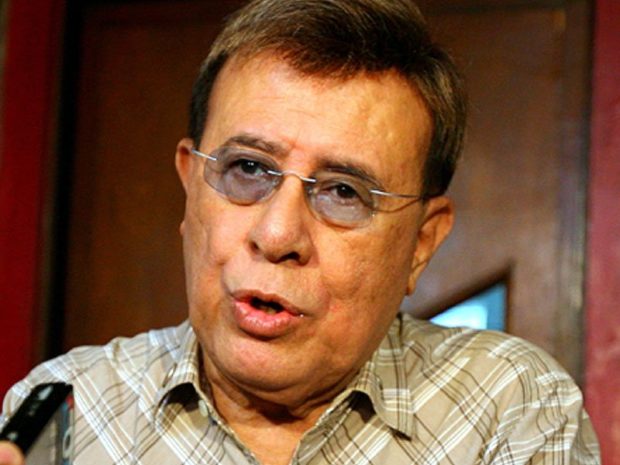
FORMER PCSO chair Manuel “Manoling” Morato. INQUIRER FILE PHOTO
MANILA, Philippines — Manuel “Manoling” Morato, a former chief of the country’s film and TV review board and later of the state lottery agency, whose government career often got him into sharp public exchanges over taste and policy, died on Friday at the age of 87.
The Movie and Television Review and Classification Board (MTRCB), which Morato headed during the administration of President Corazon “Cory” Aquino, announced his passing, hailing its former chair as a “legend of the Philippine entertainment industry.”
“Your contributions to history, the national discourse and the lives of the Filipino people will remain ever large in our hearts. You will be missed, Sir!” the MTCRB said in a social media post.
Morato’s stint as chief censor made headlines mainly for his crusade against sex-themed movies, and for his clashes with progressive artists like filmmaker Lino Brocka.
In the years after the Edsa Revolution, Brocka continued his provocative cinema with movies like “Macho Dancer” (1988) and the politically charged “Orapronobis” (1989), the last banned on Morato’s watch.
But it is a little known facet about Morato that, like Brocka, he was a lover of the arts, and a liberal associated with the democratic struggle against the Marcos dictatorship.
‘Solitary years’
Foreign Secretary Teodoro Locsin Jr. on Saturday paid tribute to Morato, remembering him as a “companion of my parents in [the] solitary years of martial law when people avoided us like a plague.’”
Locsin said his father “did not forget that under martial law no one came near us even with a 10-foot pole.’’
The late journalist and publisher Teodoro Locsin Sr. was detained together with Sen. Benigno “Ninoy’’ Aquino Jr., Manila Times publisher Joaquin “Chino” Roces and other critics of then President Ferdinand Marcos following the imposition of martial law in 1972.
The elder Locsin owned the Philippine Free Press news magazine, which, like the Manila Times and ABS-CBN, was padlocked that year when Marcos established his authoritarian rule.
Marcos was ousted in 1986 by the People Power Revolution which catapulted Cory to the presidency.
“My dad asked Cory only one favor. To give Manoling the appointment he wanted. Manoling got it,’’ Locsin said in a tweet, referring to Morato’s appointment as MTRCB chair.
Publishing, art
Prior to his MTRCB stint, Morato was a leading publisher who produced, among other books, a collection of Free Press articles by Locsin Sr. and Locsin Jr., as well as “The Urian Anthology,” a critically acclaimed volume of reviews by critics of the Manunuri ng Pelikulang Pilipino on Philippine movies in the 1970s.
Brocka’s work during that decade was extensively discussed in that book.
Besides the Free Press collection, Locsin said, Morato gave his father “a project to translate a Spanish biography of Rizal.”
Morato was also known for his love of art and his massive art collection, which former Inquirer reporter Jerry Esplanada wrote about in 2011.
Esplanada covered Morato when he headed the Philippine Charity Sweepstakes Office (PCSO) during the presidency of Gloria Macapagal-Arroyo.
According to Esplanada, Morato’s collection included at least four works by Picasso, as well as a Van Gogh and a Toulouse-Lautrec.
He was also a “proud owner of a Goya,” Esplanada said, and also acquired works by Fabian de la Rosa and Antonio Malantic, among other Filipino artists.
Controversies
Under his leadership of the PCSO, the agency launched the very first online lottery in the country in 1995.
Morato also cohosted the PCSO-produced “Dial M,” a television show that aired on state-owned NBN-4 featuring lotto winners.
His stint in government, however, was not without its share of controversies.
In 2012, the Commission on Elections filed four counts of electioneering charges against him for allegedly using “Dial M” to campaign for then-presidential candidate Gilbert Teodoro.
Also that year, Morato was named a respondent in the plunder charge filed against Arroyo, in connection with the alleged misuse of P365.99-million in PCSO funds.
The Supreme Court granted Morato’s demurrer to evidence and cleared him in 2015.
But apart from Morato’s combative public image, Esplanada remembered him as being fondly regarded by friends and colleagues. “I observed that long after his PCSO stint, his personal popularity among agency personnel remained,’’ Esplanada told the Inquirer.
He said Morato looked back to his stint in the MTRCB as a period that gave him “sleepless nights.”
“But that’s okay. What’s important is I never stole government money,” Esplanada quoted Morato as telling him.
Born on Nov. 17, 1933, Morato was the eldest son of Quezon City’s first mayor, Tomas Morato.